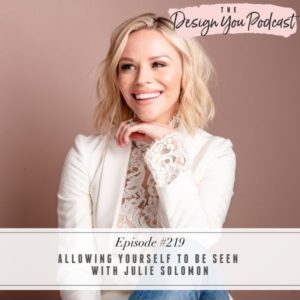
So many of us believe that we have to first see something in order to believe it. We have to get the clients we want and then we’ll show up as the person we want to be. We need the results first, and then we can do what we want. But this week’s guest is here to share why you need to be the person you want to be tomorrow today, and allow yourself to show up and be seen exactly as you are.
Julie Solomon is a speaker, business coach, host of the top-rated The Influencer Podcast, and author of Get What You Want: How to Go From Unseen to Unstoppable. She helps people build personal brands and influence and allow themselves to be seen, and she joins me this week to show you how to start showing up in your life.
In this episode, Julie shares how allowing yourself to be seen and allowing your soul and heart to shine is the way you influence the world around you. Discover the importance of showing up as your true self and putting yourself out into the world and how to shine in a way that is truly authentic to you.





